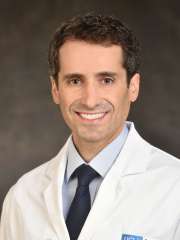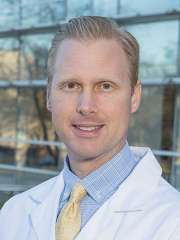Arteriovenous Fistula (AVF)
Find your care
Our expert team is skilled at treating complex cerebrovascular conditions and providing the finest and most comprehensive patient care. For help finding a neurosurgeon, call 310-825-5111.
What is an arteriovenous fistula (AVF)?
Arteriovenous fistulas form when veins and arteries create abnormal connections. Normally, those systems are separated – the arteries move blood from the heart to the tissues and the veins move it back from the tissues to the heart. In the case of arteriovenous fistulas, the direct connection results in high-pressure arterial blood flowing directly through veins. This can cause a buildup of pressure or blood clots in the veins surrounding the brain or spinal cord, resulting in nervous system dysfunction, seizure and hemorrhage.
AVFs are similar to arteriovenous malformations (AVM) in that both have abnormal connections between arteries and veins. But unlike AVMs, which develop in the tissue of the brain or spinal cord, AVFs are most commonly found in the covering of the brain or spinal cord. Most are found in the dura mater, the outermost membrane surrounding the brain and spinal cord. These are called dural arteriovenous fistulas (DAVF). Carotid-cavernous arterial fistulas (CCF) are also common. These involve branches of the carotid arteries and the cavernous sinus.
What are the symptoms of an arteriovenous fistula?
The most common symptom of either DAVF or CCF is called a bruit. A bruit is a whooshing sound in the fistula caused by the high-pressure blood flow. People with an arteriovenous fistula will often hear a heartbeat-like sound in their ears. Those with CCF may also experience swelling or redness in one or both eyes and double vision.
How is an arteriovenous fistula diagnosed?
At UCLA, we use the most advanced technology and latest imaging systems to diagnose AVFs quickly and accurately. In many cases, an AVF is discovered once the abnormal blood flow has put enough pressure on the brain to cause symptoms, but whenever possible we try to locate and treat them sooner. During your examination, your expert team may use the following imaging techniques to locate and assess your AVF:
- Magnetic resonance imaging (MRI) scans, including magnetic resonance angiography (MRA) and venography (MRV), are used to identify and locate an AVF.
- Cerebral or spinal angiography provides the most accurate images of the blood vessels and arteries affected by the AVF. These studies are also used to help plan treatment.
How is an arteriovenous fistula treated?
After your diagnosis, a multidisciplinary team of neurovascular experts will meet to review your case and create a customized treatment plan. At UCLA, we typically treat AVFs using strategies that include some combination of:
- Endovascular liquid embolization: This minimally invasive technique is performed by inserting a catheter through the groin, then injecting a liquid that solidifies in the blood vessel and cuts off blood flow to the AVF. The cerebrovascular team at UCLA is actively involved in research and testing of new liquid embolic treatments.
- Micro-coiling: Micro-coils made of platinum are placed into the artery, vein or venous sinus to seal off the AVF and prevent blood flow through it. The Guglielmi detachable coils that are now standard for treating complex AVFs were developed by researchers at UCLA.
- Microsurgical obliteration: During this open surgery procedure, the neurosurgeon disrupts or disconnects the AVF from the brain or spinal cord. We use 3-D virtual reality before surgery to map out a patient's precise anatomy and advanced imaging during surgery to guide the procedure.
Contact us
To schedule an appointment at the UCLA Cerebrovascular Program, please call 310-825-5111 or request a call back for an appointment.

Geoffrey Colby, MD, PhD

Jeremiah Johnson, MD
